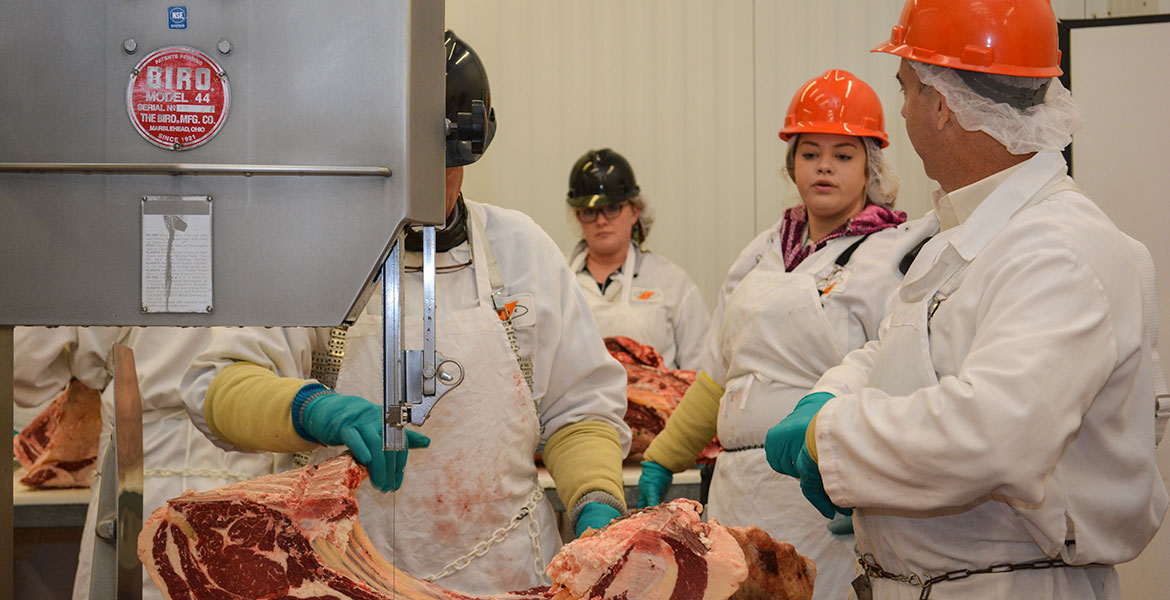
New Decade, Same Excellence
Thursday, December 5, 2019
Beef Quality Summit celebrates its 20th anniversary on the cusp of a new decade.
As the days and weeks fly by, 2019 is quickly coming to an end. The new year is approaching, but the start of a new decade isn’t the only time to celebrate.
This year boasted the 20th Beef Quality Summit, a program funded by the Oklahoma Beef Council and hosted by the Oklahoma State University Department of Animal and Food Sciences and Robert M. Kerr Food and Agricultural Products Center.
“It’s one of my favorite events we fund as the Oklahoma Beef Council,” said Heather Buckmaster, executive director of the organization. “The Oklahoma Beef Council through the Beef Checkoff underwrites the event and provides direction and support to the program.”
Using the National Beef Quality Audit as the base for the program, OSU and the Oklahoma Beef Council launched the first BQS in 1999. While the program has grown and been modified over the years, it has always been held with the goal of highlighting opportunities for improvement within the beef industry.
“In 1999, the Oklahoma Beef Quality Summit was developed by beef industry leaders and researchers at Oklahoma State University who realized the importance of keeping pace with customer desires and expectations in order to remain competitive,” said Jami Longacre, who served as the Oklahoma Beef Council executive director from 1997-2000. “It was the first program of its kind in Oklahoma that brought cattle producers and the retail, foodservice and processing industries together for a true gate to plate experience.”
The Oklahoma Beef Council helps organize the event, including the facilitation and recruitment of attendees from the cow calf level to the foodservice and retail professionals, Buckmaster said.
“The program provides a hands on educational opportunity with a focus on improving supply chain knowledge within the various segments of the beef marketing channel and help to create a greater understanding of the quality of challenges facing the beef industry,” she added.
Jake Nelson, program cohost and speaker for this year’s BQS and meat processing specialist at FAPC, has not missed a BQS since its start. Nelson said it is his duty to organize event speakers, help facilitate communication between the Oklahoma Beef Council and his OSU colleagues, secure livestock and help with the general running of the event.
“I like the program because the attendees are very responsive to the activity,” Nelson said. “I think the nature of the hands on approach is what makes it so attractive. Many livestock producers and restaurant operators participate, and their eyes are opened widely to the nature of the meat processing sector of the industry.”
With the help of many other individuals, Nelson said BQS is a unique learning experience for all who participate. The program takes attendees through the entire cycle of beef production. From the actual observation and evaluation of live animals all the way to the slaughter and fabrication of the carcass, BQS showcases nearly every aspect of the industry.
Nelson said participants are divided into teams and are tasked with selecting an animal based on its perceived market value and then fabricating a side of beef from their chosen animal. To emphasize the impact the United States Department of Agriculture’s Beef Carcass Grades have in the process, Nelson said team members also must collect quality grade and yield data and submit the information into an algorithm. The algorithm theoretically reveals the team that earned the largest profit, he added.
Nelson said tremendous levels of learning occur at this event – a statement he believes has rang true since the first BQS was held two decades ago. During the program’s start, Nelson said up to seven sessions were hosted each year and thousands of attendees have participated in the 100 plus sessions of BQS.
“The goal of the program is to highlight opportunities for improvement in the broader beef industry,” he said. “BQS can help participants see and touch those very things, which give or take value from the livestock and the products from those livestock.”
Buckmaster encourages beef producers to continue to seek out opportunities like BQS. Events like this are capable of helping further educate beef producers and help improve all segments of the supply chain, she added.
“I absolutely love to see the lightbulbs come on for attendees as the scope and complexity of the beef industry becomes clear for many of them for the first time,” Buckmaster said. “It’s an eye opening experience for the attendees as most of them have only been involved with their segment of the industry, which provides a very narrow view.”
The next BQS will be held at FAPC on the OSU campus in October 2020. Registration will be available at fapc.biz/workshops/bqs.
“Being a part of the inaugural event, I am so proud to see that the summit has not only sustained, but also successfully adapted, so progressive beef producers can continue to meet market demands,” Longacre said. “I applaud the beef industry leaders and OSU who 20 years ago had the vision to implement the Oklahoma Beef Quality Summit and appreciate those who have kept it going.”
FAPC, a part of the OSU Division of Agricultural Sciences and Natural Resources, helps to discover, develop and deliver technical and business information that stimulates and supports the growth of value-added food and agricultural products and processing in Oklahoma.
MEDIA CONTACT: Mandy Gross | FAPC Communications Services | 405-744-0442 | mandy.gross@okstate.edu
